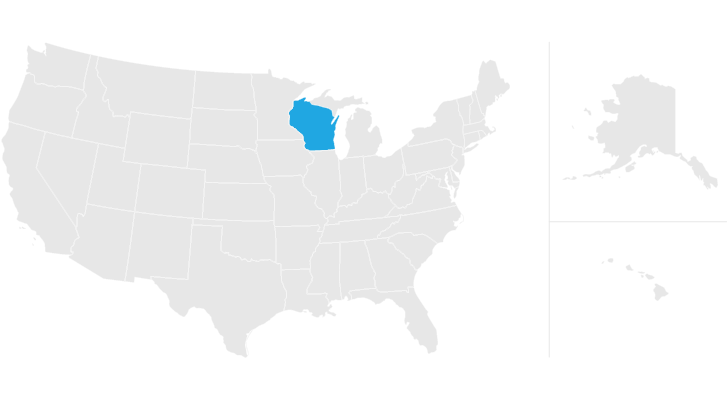

Like most other states, Wisconsin has no estate tax. The federal estate tax may apply to residents of the state, however, if their estate is valuable enough. This page is for Badger State residents who want to learn more about the estate tax as they prepare themselves and their families for what will happen after they’ve died. Of course, one of the best ways to plan your estate is to get professional assistance in the form of a financial advisor. SmartAsset can help you find a financial advisor with our free advisor matching tool.
Wisconsin does not levy an estate tax on estates of people who have died after Dec. 31, 2007, making it one of 39 states without such a tax. Eleven states and the District of Columbia have an estate tax.
The estate tax applies to the estate of a person who has recently died. Sometimes referred to as the “death tax,” the estate tax is levied before the assets in the estate are dispersed to a person’s legally designated heirs. The tax only applies to estates that surpass a legally determined threshold, which varies based on which government is levying the tax.
The estate tax is not the same as the inheritance tax. Inheritance taxes are levied on an estate’s assets after they are has passed on to a person’s heirs. The main difference comes down to who is financially responsible for the property transfer’s taxation. In the case of an estate tax, it is the deceased and their estate. By contrast, an inheritance tax requires the deceased’s inheritor or heir to pay to receive the assets. Estate tax can come on both a federal and state level, but inheritance only comes in the latter.

Wisconsin also has no inheritance tax, but there is a possibility you’ll owe an inheritance tax in another state if you inherit money or property from someone living in that state. In Pennsylvania, for instance, the inheritance tax applies to all assets left by someone living in the state, even if the inheritor is out-of-state. If someone living in another state leaves you an inheritance, make sure you check local laws so you don’t end up missing a tax payment and having to deal with the consequences.
There is no gift tax in Wisconsin either. The federal gift tax has an annual exemption of $18,000 in 2024. If you give more than $18,000 to any one person in a year, you have to report the gift to the IRS. It counts against your lifetime gift tax exemption of $13.61 million in 2024, and it also reduces your federal estate tax exemption.
Though Wisconsin does not have an estate tax, the federal estate tax may apply if your estate is large enough. The federal estate tax has an exemption of $13.61 million in 2024. The exemption is portable, so one spouse can pass their exemption to the other. This means that, with the right legal maneuvers, a married couple can protect a total of $27.22 million when the second spouse dies.
If an estate exceeds the exemption, the federal government taxes it according to a series of brackets with ascending rates. The top rate is 40%.
| Taxable Estate* | Base Taxes Paid | Marginal Rate | Rate Threshold** |
| $1 – $10,000 | $0 | 18% | $1 |
| $10,001 – $20,000 | $1,800 | 20% | $10,001 |
| $20,001 – $40,000 | $3,800 | 22% | $20,001 |
| $40,001 – $60,000 | $8,200 | 24% | $40,001 |
| $60,001 – $80,000 | $13,000 | 26% | $60,001 |
| $80,001 – $100,000 | $18,200 | 28% | $80,001 |
| $100,001 – $150,000 | $23,800 | 30% | $100,001 |
| $150,001 – $250,000 | $38,800 | 32% | $150,001 |
| $250,001 – $500,000 | $70,800 | 34% | $250,001 |
| $500,001 – $750,000 | $155,800 | 37% | $500,001 |
| $750,001 – $1 million | $248,300 | 39% | $750,001 |
| Over $1 million | $345,800 | 40% | $1,000,001 |
*The taxable estate is the total above the 2024 federal exemption of $13.61 million.
**The rate threshold is the point at which the marginal estate tax rate kicks in.

Wisconsin is moderately tax-friendly for retirees. The state does not tax Social Security benefits, but a portion of income from public pensions is taxable. This includes pre-tax contributions, like employee-required contributions, but not personal contributions made with post-tax money. The state also fully taxes withdrawals from 401(k) plans and other retirement accounts, as well as any income from private pensions. Income tax rates in Wisconsin range from 3.50% to 7.65%.
Wisconsin has among the highest property tax rates in the nation, as the average effective rate is 1.73%.
Photo credit: ©iStock.com/csfotoimages, SmartAsset, ©iStock.com/vm
Ben Geier, CEPF®Ben Geier is an experienced financial writer currently serving as a retirement and investing expert at SmartAsset. His work has appeared on Fortune, Mic.com and CNNMoney. Ben is a graduate of Northwestern University and a part-time student at the City University of New York Graduate Center. He is a Certified Educator in Personal Finance® (CEPF®) and a member of the Society for Advancing Business Editing and Writing. When he isn’t helping people understand their finances, Ben likes watching hockey, listening to music and experimenting in the kitchen. Originally from Alexandria, VA, he now lives in Brooklyn with his wife.
Read More About Estate Planning



More from SmartAsset
SmartAsset Advisors, LLC ("SmartAsset"), a wholly owned subsidiary of Financial Insight Technology, is registered with the U.S. Securities and Exchange Commission as an investment adviser. SmartAsset's services are limited to referring users to third party advisers registered or chartered as fiduciaries ("Adviser(s)") with a regulatory body in the United States that have elected to participate in our matching platform based on information gathered from users through our online questionnaire. SmartAsset receives compensation from Advisers for our services. SmartAsset does not review the ongoing performance of any Adviser, participate in the management of any user's account by an Adviser or provide advice regarding specific investments.
We do not manage client funds or hold custody of assets, we help users connect with relevant financial advisors.
This is not an offer to buy or sell any security or interest. All investing involves risk, including loss of principal. Working with an adviser may come with potential downsides such as payment of fees (which will reduce returns). There are no guarantees that working with an adviser will yield positive returns. The existence of a fiduciary duty does not prevent the rise of potential conflicts of interest.